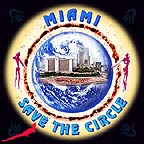|
By
David Usborne in Miami
1
December 1999
An
American Indian archaeological site in the heart of Miami,
revealing secrets going back at least 2,000 years, has had an eleventh-hour
reprieve.
Hours
before a developer was due to obliterate the "Miami Circle"
yesterday, county commissioners voted to borrow $8.7m (£5.4m)
to help to buy
him off. Two 40-storey towers were to go up on the plot, at the mouth
of the
Miami River on the edge of Biscayne Bay. Barring last-minute glitches,
however, the way is open for a deal that will see the building of a
cultural
museum on the site.
To
the passer-by, it doesn't look much - a dusty parcel of 2.2
acres surrounded by chain-link fencing in the shadow of the giant Sheraton
Hotel. At its centre is a circle of pale limestone, 38ft in diameter,
pitted
with what look like post-holes. But to historians and archaeologists
who have
been excavating here furiously for months, this is nothing less than
America's Stonehenge.
Discovered
last year, when some apartment buildings were
demolished, the site stirred excitement among archaeologists worldwide.
Even
more astonished was Miami itself: heritage in this city meant South
Beach's
touristinfested Art Deco district. Now, right in its heart, it has
possibly
the most important Native American treasure trove on the continent.
Most
experts believe the circle is the work of the Tequesta Indians, who
for
centuries roamed the lower half of the Florida peninsula. They think
the
post-holes supported the roof of a meeting house or even a temple -
some of
the patterns appear to have mystical alignments to the Sun.
Moreover,
carbon dating suggests that the site, if not the circle
itself, dates back at least 2,000 years or even beyond. Among artefacts
uncovered are the remains of a 5ft shark.
"For
many people in South Florida there is a sense of
rootlessness and a lack of a sense of history," said John Ricisak,
a state
archaeologist. "We know now there is history here."
In
February, Miami-Dade County filed a lawsuit giving it the
right to take possession of the land on condition it paid the construction
company, Brickell Point, its market value, put at $26.7m. But a disappointing
response to fund-raising meant the county was $8.7m short of the $20m
it
needed on Monday. The day was saved by the Trust for Public Land, a
preservation group based in San Francisco, which offered to lend the
£8.7m at
8.5 per cent interest.
©
1999 Independent Digital (UK) Ltd.
|


